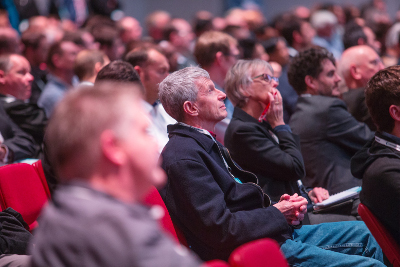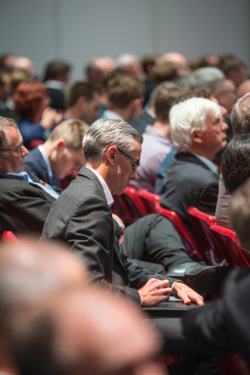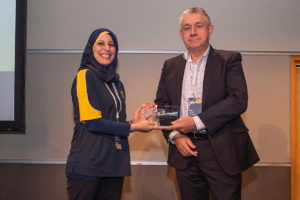CALL FOR PAPERS
Abstract submissions are now closed.
Key Dates to Remember
| Wednesday 17 April 2024 | Abstract submissions close |
| Friday 17 May 2024 | Notification of acceptance |
| Friday 7 June 2024 | Authors to confirm participation |
| Friday 9 August 2024 | Full paper due |
Overview
There is no better event than the EEA2024 Conference and Technology Exhibition to connect, collaborate and grow your knowledge around the future of our industry.
An electric future is critical to Aotearoa New Zealand achieving net-zero carbon emissions, putting our people front and centre on the road to decarbonisation.
It is an exciting time to be working in the industry.
But there are challenges to solve around how we deliver more sustainable, resilient infrastructure, and customer-centric energy solutions as the nation transitions, all the while ensuring a safe, reliable, and secure electricity supply.
New ideas, greater creativity and different perspectives are critical to achieving the integration of more clean, renewable fuels, smart infrastructure, and the design and integration of new technologies such as those to enable demand flexibility.
To enable change we need fresh thinking, innovation and collaboration. We also need to understand future trends and risks, and work more closely with customers bringing smart technologies to the sector.
To enable this transition we need to grow and share our collective knowledge.
EEA2024 is the place where it all happens. In 2023 we welcomed more than 1200 delegates, exhibitors and visitors over our three-day event.
The event brings together thought leaders, technical and engineering experts, influencers, and those in the field, from across the energy industry to focus on finding solutions. It is about invigorating and empowering our people to step up to the challenge of delivering Aotearoa’s decarbonised future.
EEA2024 also includes a comprehensive Technology Exhibition, a fantastic interactive opportunity for businesses from around the world and here at home, to showcase their technology, services, people, and products, and for delegates to get ‘hands-on’ with the future of the sector.
As the largest collaborative power industry forum in Aotearoa, this is also where connections are made and new partnerships are formed.
So join us in 2024 to continue the korero, build your understanding and support the mahi of our community to ensure we are ‘Delivering a Net Zero Carbon Energy Future’.
We look forward to seeing you on 10-12 September 2024 in Christchurch!
Abstract/Paper Submission
Paper proposals are invited from all sectors and companies in the industry.
As a first step in the 'Call for Papers' we are inviting abstracts from industry stakeholders. Abstracts can include engineering and strategic analysis, research insights, case studies, and project results. Details of theme areas are provided below.
If you wish to submit an abstract for consideration for the Conference Programme, you must also intend to register for the Conference and Exhibition.
To access the Abstract Submission guidelines and terms and conditions, please CLICK HERE.
All abstracts are to be submitted electronically in accordance with the guidelines provided.
Call for Papers Checklist Before Submitting
Please make sure you have the following information ready before submitting your abstract:
- Contact details for the corresponding author (the person who will receive all communication regarding the submission)
- Presentation Title - should be no more than 20 words
- Theme - please decide which theme you like to allocate to your submission. CLICK HERE to view the list of themes
- Abstract - no more than 400 words, images are not allowed
- Photo of presenting author - please upload a recent professional portrait photo of each presenting author. Photos should be no larger than 200 px wide and should preferably be a jpeg file.
- Name and affiliation of all authors linked to the submission
- Biography of presenting author - biography word limit is 100 words
Paper Themes and Context
‘Delivering a Net Zero Carbon Energy Future’.
Our nation’s electric future is one of decarbonisation, deregulation, digitalisation and decentralisation – all of which are critical to achieving net zero emissions by 2050.
The pace and scale of change required is unprecedented bringing a wealth of new opportunities and challenges to overcome.
In 2023, we explored the theme of 'Delivering a Net Zero Carbon Energy Future'. With so much work ahead, we are continuing with this theme again in 2024.
Join us as we work to grow and share our collective knowledge by presenting at EEA2024!
We are seeking presentations from all you forward thinkers, industry experts, futurists, problem solvers and curious minds to help build our knowledge on the challenges and opportunities we face as we transition to a low carbon economy.
Presentation themes could include:
- Emerging technologies and flexibility
- Opportunities, Integration, and Impacts
- Asset management, climate change, resilience, and future asset planning
- Artificial intelligence, automation, digitisation, data and communication
- Asset engineering – management, optimisation, and integration
- Future capability
- Consumer/Community Focus & Market Models
- Sustainability and environmental excellence
- Energy strategy and regulation
- Enabling distributed energy resources (DER)
- Security and reliability of supply
- Safety - critical risks, essential controls and continual improvement
The following are some paper ‘topic areas’ to consider. (Note: Topics below are NOT in any priority order nor is it an exhaustive list of topics that could be offered).
Emerging technologies and flexibility
- Open networks
- Renewable distributed generation (e.g., solar, wind, micro generation, pump storage etc)
- Distributed energy resources (DER) - Battery storage
- Flexibility and aggregators
- Emerging technology - trials and outcomes
- Electric transport infrastructure
- Demand response and pricing frameworks
- Micro-grids
- 'Smart opportunities' - appliances, homes, and cities
- Network stability
- Hydrogen - a future power and energy storage source
- Customer’s technologies and smart multi energy solutions
Asset Management climate change, resilience, and future asset planning
- Asset management – priorities, planning and performance.
- Maintenance strategies, standards, and issues- poles, conductors, cables, and other key assets
- Critical asset management (e.g., transformers, poles, conductors, switchgear, earthing, and substations)
- Ageing Infrastructure - lifecycle and reliability - maintain, refurbish, upgrade or replace?
- Asset and system resilience
- Power quality, security, and stability
- Earthing
- Projects /case studies
Artificial intelligence, automation, digitisation, data and communications
- Asset data – frameworks, condition assessment, health indicators, planning and performance
- Automated Demand Response (ADR)
- Machine learning
- LV and HV data for asset and system management
- System modelling and simulation
- Asset forecasting and planning
- Cyber security/data protection
- Unmanned aerial vehicles
- Data visualisation
- Artificial General Intelligence (AGI) , data science and machine learning - operational aspect of the grid.
- Peer-to-peer trading, Blockchain, Big Data, Edge intelligence and The Internet of Things
- SCADA & ADMS
Asset Engineering - Management, Optimisation, and Integration
- Interoperability - common platforms, interactions and integrating new technologies and existing assets.
- Distribution system operation
- Life cycle engineering
- Infrastructure design for new technologies and safety
- LV networks - monitoring, modelling and management
- Integration of distributed renewables - solar, battery and wind
- Automation/SCADA/Fault resolution
- Work method selection - Live or de-energised
Future Capability
- Developing/maintaining core skills, capability, and engagement with our people
- Workforce diversity and inclusion - attracting and retaining talent
- Future Work
- Delivering on engineering, technical, IT and analytic capability
- Workforce gaps - trends and challenges
- Occupational licencing
- Digitised learning
- Common Competency - opportunities and challenges
- Innovation contracting/service delivery.
Net Zero - Drivers for Change
- Energy Strategy 2024
- Climate change
- Regulatory frameworks - economic security and reliability - impacts on customer service, investment, technology,
- Grid connection, technology, markets, and priorities
- Electrifying transport and the impact on the power system
- International standardisation for NZ adoption of technology, systems and products
Consumer/Community Focus & Market Models
- Behind the meter - Impact of smart consumer technology
- Customer/community demand response - aggregators, pricing, demand and resilience
- Distributed energy resource management systems (DeRMS)
- Unlocking customer data for insights on future directions
- Prosumers and future electricity markets
Safety, Health and Environment
- Wellbeing and health
- Safety Impacts of decarbonization and emerging technologies
- Critical risks - essential control strategies/work method selection
- LV work management
- Monitoring and auditing workplace and public safety
- Hazardous substances – Asbestos, SF6
 Audience
Audience
Previous events have been attended by industry CEOs and senior managers; engineering and asset management staff; technical, safety and business development managers; system analysts and planners; field staff and supervisors; engineering students and academics from NZ universities; Government officials; consultants and contracting staff; standards writers and other industry stakeholders.
 Why Submit?
Why Submit?
The writing and presentation of technical papers is an important part of every person's professional development and training. It provides the best opportunity to share your experience and innovative work among enthusiastic and knowledgeable industry engineers.
The EEA Conference gives the opportunity to profile and share information on new engineering knowledge, practices or technology; and a platform for a company or individual to get recognition as an engineering leader.
University and Polytech students are encouraged to submit paper proposals. The EEA has a strong commitment to the future development of our industry engineering students and integrating student learning with the Conference experience. Student papers keep industry informed on current research projects, whilst the Conference provides the opportunity for students to meet industry engineers and employers.
 Best Paper Awards
Best Paper Awards
All papers submitted are eligible for the Best Paper Awards which are awarded to papers of outstanding quality. The Best Paper Awards categories include:
- EEA Member
- Best Paper Presentation (sponsored by the IET)
- Student
- Non-Member
For further information on these awards please CLICK HERE.
